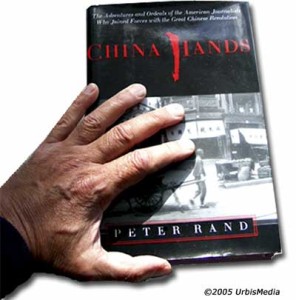 After I had made several trips to China in different capacities an Asian friend commented that I was getting to be a “China hand.” There was more flattery that veracity in that compliment. Beyond a very abbreviated lexicon of words and phrases in Mandarin and Cantonese that are a long way from the conversational, I am illiterate in spoken Chinese and more so in written Chinese. But if I needed any confirmation that this appellation did not apply to me it was Peter Rand’s China Hands .
After I had made several trips to China in different capacities an Asian friend commented that I was getting to be a “China hand.” There was more flattery that veracity in that compliment. Beyond a very abbreviated lexicon of words and phrases in Mandarin and Cantonese that are a long way from the conversational, I am illiterate in spoken Chinese and more so in written Chinese. But if I needed any confirmation that this appellation did not apply to me it was Peter Rand’s China Hands .
Most of those who became China hands went there when they were young. Some were scholars, some diplomats, some adventurers and businessmen, but most were journalists. Some combined elements of more than one. Most learned the language, some very well, and almost all had a sense that China—in the period of 1905 to 1949—was a place that would not only make their careers or fortunes, but could remake the world. Things turned out somewhat differently than predicted, but some predictions may yet come true.
Their names are fading into them mist of China’s history in the first half of the 20 th Century; names like Vincent Sheean, Harold Issacs, Agnes Smedley, Edgar Snow, Theodore White, and the author’s father, Christopher Rand. It was the younger Rand’s desire to know more about his father, a journalist who spent almost all of his life away from his family, indulging in, as was characteristic of many China hands, his love for China, travel, politics, booze, often a star-crossed love affair, and consorting with the likes of Chiang Kai-shek, Gen. “Vinegar” Joe Stillwell, Madame Sun Yat-sen, Chu The, Zhou En-lai, and Mao Zedong.
China Hands is a meticulously researched and well-composed history of a remarkable period of journalism. Woven into the stories of these reporters for Life, The Christian Science Monitor, The Saturday Evening Post, The New Yorker , and The New York Herald , among many others, are the death of the Manchu Dynasty, the republic, the Japanese invasion, and the civil war between the Communists and the Kuomintang, enough tumultuous history for several nations in so short a period of time.
Then the era of the China hands came to an abrupt end in 1949 when the Communists sealed their victory over Chiang’s KMT, which retreated to Taiwan with as much loot as they could carry. China hands Edgar Snow, Agnes Smedley, and Harold Issacs, among others, had spent years cultivating contacts and friendships while residing in mountain caves alongside Mao, Lin Piao, Chu The and Zhou En-lai; but suddenly they were no longer welcome. This was not because of their reporting; Smedley was herself a communist, and Snow wrote admiringly of the reds. But they got caught up in the complex politics of it all. Many of them were outposted in Chungking (Chongqing) during the Japanese occupation, when it was the KMT’s “capitol.” Most China hands knew that Chiang and the KMT were thieves and scoundrels. Stillwell hated Chiang outwardly, leading to his being pulled from the Asian theater even though he was fluent in Mandarin and knew the Chinese culture intimately. But some China hands worked for stridently anti-communist publishers, such as Henry Luce ( Life and Time ) and had to tow the line.
But the main factor affecting the ouster from the inner circles of China’s new rulers in 1949 was that the United States had made its choice to back Chiang. China’s door pretty much slammed to western reportage and remained shut for nearly 24 years. The China hands were without a country, and with the rise of McCarthyism in the U.S., because of their years in China and their closeness with the reds, they were “purged” at home as well. A half-century of gathering political and cultural intelligence on the world’s largest nation was all but shunted aside until—and, ironically, it was Edgar Snow who first brought the overture to Nixon—a rapprochementwas opened in 1972.
Since Deng Xiao-ping’s further opening of China to the investment and ways of the West in 1978, the country has changed with breathtaking pace. With the economically disastrous “great leaps” and “Cultural Revolution” of Mao behind them the Chinese launched into a sustained period of giddy growth and profound social (if not political, as Tiananmen Square demonstrated) changes chronicled by a new breed of China hands like Robin Lane Fox, Orville Schell and Nicholas Kristoff. China’s periods of famine, wars and revolutions seems to be fading into the tapestry of its long history, along with the bold exploits and words of those who witnessed it for the rest of us.
___________________________________
©2005, James A. Clapp (UrbisMedia Ltd. Pub. 4.4.2005)
